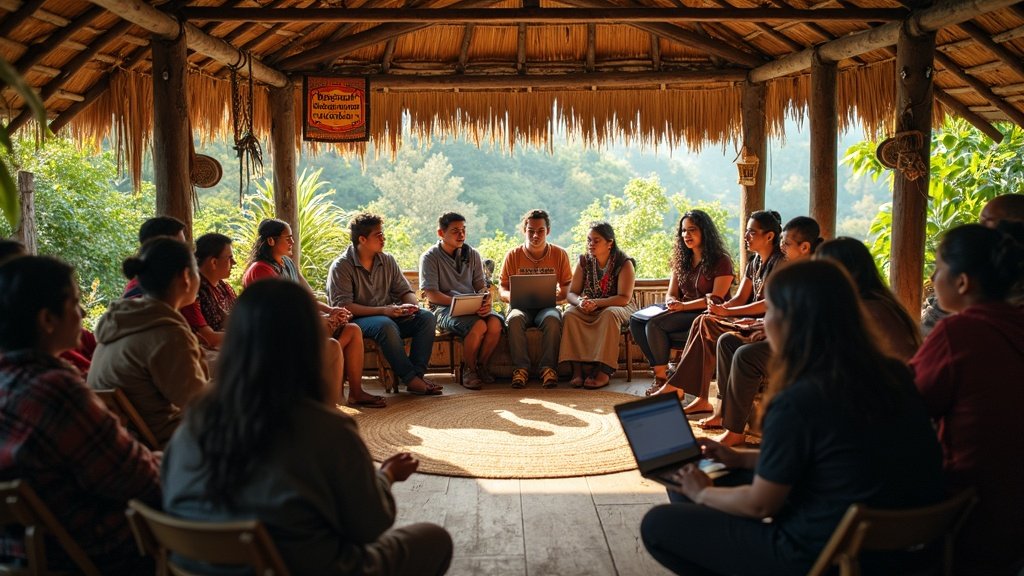The Dual Impact of AI on Indigenous Peoples
Artificial intelligence (AI) is rapidly reshaping our world, and for Indigenous Peoples, this technology presents both significant challenges and promising opportunities. A key challenge is the risk of perpetuating historical injustices. AI systems are often trained on data that lacks Indigenous voices and knowledge, leading to inherent biases that can reinforce harmful stereotypes and exclusion. Without proper safeguards, AI can also facilitate the appropriation of Indigenous culture and traditional knowledge without consent. At the same time, Indigenous communities often face significant barriers to accessing new technologies, particularly in rural areas, which widens the existing digital divide and prevents them from fully participating in the AI revolution.
Challenges: Bias, Exclusion, and Appropriation
The risks of AI for Indigenous Peoples are profound and multifaceted. AI systems, by their nature, reflect the biases of the data they are trained on. This can lead to algorithms that make decisions that are inherently discriminatory, from resource allocation to legal outcomes. The problem is exacerbated by the fact that historical and contemporary data often either excludes or misrepresents Indigenous perspectives.
Furthermore, AI’s ability to analyze and replicate patterns can lead to the appropriation of cultural heritage and traditional knowledge. Without robust legal and ethical frameworks, the unique intellectual property of Indigenous communities could be exploited for commercial gain, undermining cultural preservation efforts.
Opportunities: Language and Cultural Revitalization
Despite the risks, AI also holds immense potential to benefit Indigenous Peoples when developed and deployed inclusively and ethically. One of the most promising opportunities lies in language revitalization and cultural preservation. AI-driven tools, such as natural language processing models, can be trained to help document, transcribe, and teach endangered Indigenous languages. This technology can contribute significantly to reversing the decline of these languages and ensuring their survival for future generations. Additionally, AI can be used to create digital archives of oral histories, traditional stories, and cultural practices, making them more accessible to community members and the wider world, while maintaining Indigenous data sovereignty and control.
The Call for Active and Meaningful Inclusion
It is essential that Indigenous Peoples are not just passive subjects of AI development but active participants in shaping its future. The UN Permanent Forum on Indigenous Issues recognized this in its recommendations from the 24th session in 2025. The Forum highlighted the critical importance of meaningful inclusion of Indigenous Peoples in all stages of AI development, governance, and application. This means ensuring that Indigenous voices are at the table, from the initial design of AI systems to the policies that govern their use. Their inclusion is a matter of both human rights and a practical necessity for creating AI that is equitable, relevant, and respectful of diverse cultures and knowledge systems.
The UN’s Human Rights Framework for AI
The international community is increasingly recognizing the need for a human rights-based approach to AI governance. The UN General Assembly adopted a landmark resolution in 2024 emphasizing that human rights and fundamental freedoms must be respected, protected, and promoted throughout the entire lifecycle of artificial intelligence systems. This resolution provides a crucial framework for national and international bodies to follow. Respecting Indigenous Peoples’ rights, including their right to data sovereignty and promoting Indigenous-led innovation, are identified as key to realizing the positive potential of AI. This approach aims to prevent the technology from perpetuating harm and instead ensures that it serves as a tool for empowerment and sustainable development.
The Role of Data Sovereignty
A central concept in ensuring Indigenous rights in the age of AI is data sovereignty. This principle asserts that Indigenous communities have the right to own, control, access, and possess their own data. In the context of AI, this means that any data related to Indigenous Peoples, including their languages, cultural practices, and demographics, should not be used to train AI models without their explicit and informed consent. Furthermore, Indigenous communities should have the authority to govern how their data is collected, stored, and utilized. This right to self-determination over their digital presence is vital for preventing historical patterns of exploitation and ensuring that the benefits of AI are shared equitably.
International Day of Indigenous Peoples: A Timely Theme
The upcoming International Day of the World’s Indigenous Peoples, with its theme, “Indigenous Peoples and AI: Defending Rights, Shaping Futures,” will put a global spotlight on this critical issue. This theme provides a timely moment to foster dialogue and action for an inclusive and rights-based digital transformation. The day serves as an opportunity for governments, technology companies, academic institutions, and Indigenous communities to come together and discuss how to collaborate on developing ethical AI. It is a moment to raise awareness about the challenges, celebrate Indigenous-led innovations, and commit to creating policies and practices that ensure AI is a force for good, supporting the rights and futures of Indigenous Peoples worldwide.
Fostering a Rights-Based Digital Transformation
As AI’s influence grows, ensuring the rights of Indigenous Peoples becomes an urgent priority. The challenges of algorithmic bias and data appropriation are significant, but so are the opportunities for language and cultural revitalization. By actively including Indigenous voices in AI development and governance, and by upholding principles of data sovereignty, the global community can leverage AI to empower these communities rather than perpetuate harm. The UN’s recognition of this issue provides a roadmap for a rights-based digital transformation, highlighting the importance of dialogue and collaboration to build a future where AI serves as a tool for justice, equity, and cultural preservation.
Read more: AI and Religious Freedom: Navigating Faith in the Digital Age























